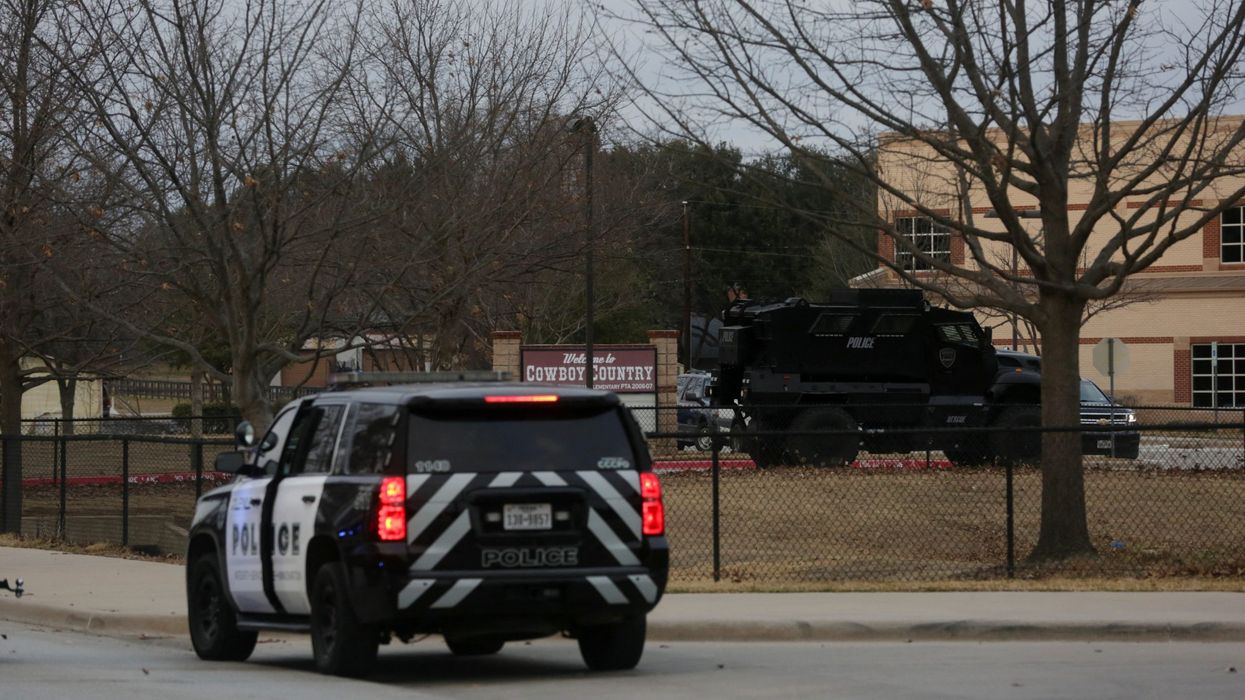ALL FOUR people taken hostage in a more than 10-hour standoff at a Texas synagogue have been freed unharmed, police said late Saturday (15), and their suspected captor is dead.
The siege in the small Texas town of Colleyville - in which the suspect was apparently demanding the release of a convicted Pakistan prisoner - had sparked an outpouring of concern from Jewish organisations in the United States as well as from the Israeli government.
Colleyville police chief Michael Miller told a news conference that a "rescue team breached the synagogue" on Saturday (15) evening and rescued the three remaining hostages - all adults - being held inside. A first hostage had been released unharmed a few hours earlier.
"The suspect is deceased," Miller told reporters.
FBI Dallas special agent Matt DeSarno said the four hostages - who included a much-loved local rabbi, Charlie Cytron-Walker - did not need medical attention and would soon be reunited with their families.
"He did not harm them in any way," he said.
There were reports from journalists at the scene of a loud explosion and gunshots at the synagogue shortly before the press conference.
That was more than 10 hours after police were alerted to the emergency at the Congregation Beth Israel in Colleyville, some 25 miles (40 kilometres) west of Dallas.
Officers evacuated the synagogue's surroundings and cordoned off the area, the police force said.
ABC News reported that the hostage-taker was armed and had claimed to have bombs in unknown locations. That was not confirmed by the police although Miller said that "bomb techs are clearing the scene."
Quoting a US official briefed on the matter, ABC reported the man was demanding the release of Aafia Siddiqui - a Pakistani scientist who in 2010 was sentenced by a New York court to 86 years in prison for the attempted murder of US officers in Afghanistan.
She is currently being held at Federal Medical Center (FMC) prison in Fort Worth, Texas.
DeSarno told the news conference the suspect had been identified but did not disclose his identity.
The FBI special agent did not confirm the suspect's demands but said they were "focused on one issue that was not specifically threatening to the Jewish community" - and that he did not believe there was an ongoing threat.
ABC initially said the man claimed to be Siddiqui's brother, but later clarified her brother is in Houston - while other experts said the word the man used in Arabic was more figurative and meant "sister" in the Islamic faith.
Siddiqui's lawyer said she "has absolutely no involvement" in the hostage situation in a statement to CNN. The lawyer confirmed that the man was not Siddiqui's brother and said she condemned his actions.
DeSarno said police negotiators "had a high frequency and duration of contact with" the hostage-taker.
"There were times when it stopped for periods of time and like many hostage situations, the relationship between the negotiators and hostage-taker had been floating a little bit and sometimes got intense," he said.
“Horrifying”
A live stream of the congregation's Shabbat morning service, available on Facebook for around four hours during the standoff, appeared to capture audio of a man talking loudly - although it did not show the scene inside the building.
In it, he could be heard saying, "You get my sister on the phone," and "I am gonna die."
He was also heard saying: "There's something wrong with America."
Beth Israel congregation member Ellen Smith, who grew up going to the synagogue, described the situation as "shocking and horrifying" in a CNN interview.
She said the congregation was a "tight" community, and the rabbi in particular, was "the best human I think anyone could ever meet."
But she said it was "not shocking" the crisis occurred in a Jewish community.
"Cases of anti-Semitism have risen lately, but since Jews were first walking the Earth, we have been persecuted," she said. "It feels almost hopeless."
President Joe Biden pledged to "stand against anti-Semitism and against the rise of extremism in this country."
"I am grateful to the tireless work of law enforcement at all levels who acted cooperatively and fearlessly to rescue the hostages," he said.
"We are sending love and strength to the members of Congregation Beth Israel, Colleyville, and the Jewish community."
Israel's ambassador to the United States, Michael Herzog, said he was "grateful" all the hostages had been released safely.
"No one should ever be afraid to assemble in their place of worship," the Jewish Community Relations Council said in a statement.
The Council on American-Islamic Relations condemned the hostage situation and said it was in contact with Colleyville Jewish leaders to "provide any assistance possible."
(AFP)
Hostages freed in Texas synagogue standoff, suspect dead




